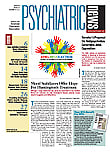Which is more likely to determine children’s outlook on life: their genetic makeup or the quality of parenting they receive? Both are important, but good parenting can actually influence genetic susceptibility.
A group of researchers from the University of Denver, Rutgers University, the University of Colorado-Boulder, and the University Medical Center Groningen in Groningen, the Netherlands, recently teamed up to investigate their hypothesis that children and adolescents carrying short alleles of 5-HTTLPR, the so-called depression gene, would be more influenced and responsive to supportive and unsupportive parenting and would exhibit higher and lower positive affect, respectively. They investigated this potential gene-environment interaction (GxE) in three independent studies of children and adolescents aged 9 through 15.
The first study included 307 children and adolescents recruited from public schools. Each child provided a DNA sample by buccal swab. A parent completed the Alabama Parenting Questionnaire, a measure of positive parenting, and the children completed the positive affect subscale from the Positive Affect and Negative Affect Scale for Children.
The second study had 197 children and adolescents recruited from public schools. Each child provided a DNA sample by buccal swab and completed the Positive Affect and Negative Affect Scale for Children. Parenting behaviors were ascertained during videotaped observations of parent-child interactions in the laboratory. Behaviors were coded on a 1 to 5 scale by a trained team of reliable coders.
The third study consisted of 1,370 participants in the Dutch prospective cohort study Tracking Adolescents' Individual Lives Survey (TRAILS). Perceived positive parenting was assessed by the 18-item Emotional Warmth scale of the EMBU (a Swedish acronym for My Memories of Upbringing) for children (EMBU-C), and by the Behavioral Activation System Drive scale of the Behavioral Inhibition System/Behavioral Activation System scales, selected for high correlation with positive affect as assessed with the Positive Affect and Negative Affect Scale. DNA was extracted from buccal swabs or blood samples from the children.
The researchers presented the results of all three studies together. “Results from all three studies showed that youth homozygous for the functional short allele of 5-HTTLPR were more responsive to parenting as environmental context in a ‘for better and worse’ manner. Specifically, the genetically susceptible youth who experienced unsupportive, nonpositive parenting exhibited low levels of positive affect, whereas higher levels of positive affect were reported by genetically susceptible youth under supportive and positive parenting conditions,” wrote Benjamin Hankin, Ph.D., an associate professor of clinical child and developmental cognitive neuroscience psychology at the University of Denver, and his colleagues.
Lead author Hankin explained how this particular GxE study differed from previous works: “Prior studies measured children’s temperament, not genetic susceptibility. And most previous research examined only lack of negative environments and lack of negative outcomes, not the presence of positive outcomes in the context of positive environments,” he told Psychiatric News. “Our intention was to evaluate the full range of environments, from positive to less supportive parenting, and child outcomes from positive emotion to lack of positive emotion, for environmental contexts (parenting) and outcomes (positive emotion) that have clear importance to the development of psychiatric disorders, resilience, and socioemotional functioning.”
Hankin also stressed how these findings might affect how 5-HTTLPR is viewed: “When the environment is negative and stressful, negative outcomes such as depression are more probable for individuals carrying a short allele. However, our data show that the short allele also affects individuals when they are reared in very positive, supportive environments; these individuals exhibit high levels of positive emotion. These findings further the idea that certain genes may not be ‘vulnerability’ genes that place individuals at risk for psychopathology, but rather ‘plasticity’ genes that affect individuals’ sensitivity and reactivity to environments. …”
The U.S. portion of this work was supported by a grant from the National Institute of Mental Health.


